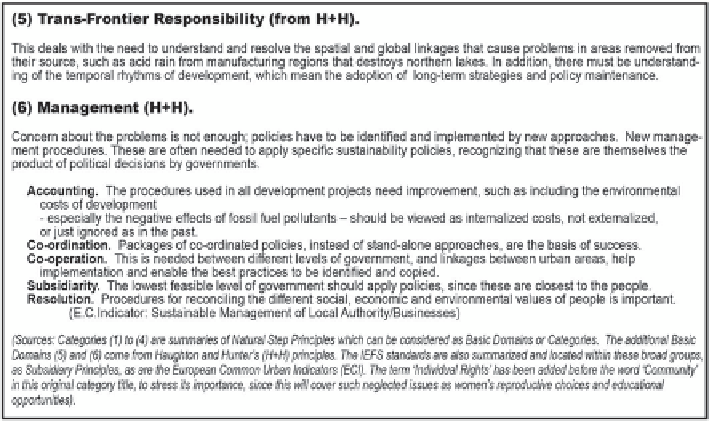Geography Reference
In-Depth Information
Fig 51
(continued)
agency that shows businesses and urban places how to redesign their operations
to achieve more sustainable practices. Despite the utility of this approach, it could
be argued that the rigorous adoption of the first three of these principles would
mean that most development would grind to a halt, given current practices. So the
principles may be best seen as a general context within which progress to greater
sustainability can be identified and subsequently measured.
The second source comes from a more detailed and specifically ecological ap-
proach adopted by the emerging Ecocity movement (Register
2006
), which focuses
upon the need to make urban places function in harmony with the biosphere and
ecosystems. The International Ecocity Framework and Standards (IEFS) move-
ment, which held its 9th international meeting in Montreal in 2011, proposed 15
system categories that can be used by cities or regions to measure their progress
in sustainability. Since these ideas extend most of the four Natural Step Principles,
their usual order is reorganized in Fig.
5.1
and placed into the most appropriate of
the four basic categories prosed by the Natural Step scheme.
A third major source of sustainability indicators, namely those proposed by the
European Commission in their the European Commission Indicators (ECI
2003
),
which were designed to be used by local authorities to measure the quality of their
urban environments, are also allocated to the various groupings shown in the table.
A fourth source of dimensions comes from Haughton and Hunter's (
1994
) pioneer-
ing topic on
Urban Sustainability
. This identified what they called the three funda-
mental principles and nineteen guiding principles underlying sustainability, which
were derived from socio-economic, ecological and management categories. An ap-
plication of their ideas to a city trying to implement sustainability has shown that
there is some inconsistency between the various indicators (Davies
1996
). Many

